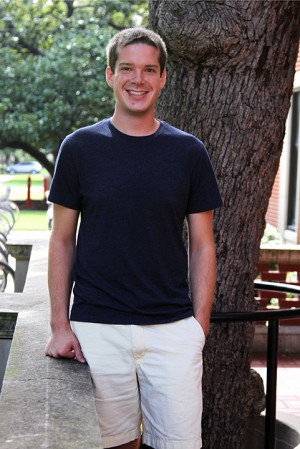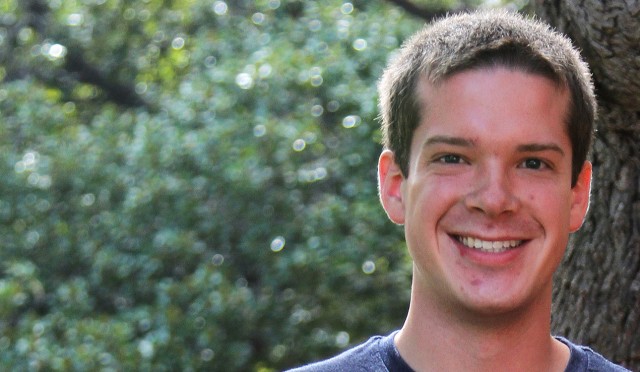By Rae Jefferson
Reporter
Most Baylor students would agree that juggling school, work and extracurricular activities is difficult.
But when you’re a senior who has decided to change majors while working a seemingly 24-hour-a-day job and participating in several student organizations, difficult is hardly the word.
St. Louis, Mo. senior Luke Smith is all too familiar with trying to find balance in his life.
He has worked for three years as a community leader in Alexander Residence Hall, which houses approximately 141 male students in the Honors Residential College.
His time is delegated between honors classes, CL responsibilities, prehealth honor society Alpha Epsilon Delta, student Medical Service Organization, mentoring with Communities in Schools and activities at First Baptist Church of Woodway.
“I stay busy for sure,” Smith said.
A former premedical student, Smith said he has traded stethoscopes for number crunching and settled into the Business Fellows program with a focus in economics.
Business Fellows allows students to combine a bachelor of applied arts degree in business with other majors.
Smith said he has been a part of Business Fellows since his freshman year, but intended to major in biology.
“I decided combining business and pre-med couldn’t hurt,” Smith said.
Smith was settled into the premedical academic track until the spring semester of his junior year, when he began to have doubts about his chosen field of study.
Interactions with the Pre-medical Advisory Committee, which helps students prepare for medical school admission interviews, caused Smith to question his passion for medicine, he said.
“They ask a lot of really tough questions,” Smith said.
Smith said many premedical students never explore options beyond going to medical school and becoming a doctor.
“As a pre-med student, we’re trained to have almost a one-track mind,” he said.
Over the summer, Smith interned with Baylor alumnus Musheer Kamau in the South American country Suriname. Kamau works with the Inter-American Development Bank.
Smith served as a research fellow for economics projects. He said the internship allowed him to explore the business side of the medical industry, and helped him solidify the decision to change his major to economics.
“It was really cool to see another career opportunity,” Smith said. “I got to see the world from a different point of view.”
Although confident in the decision he’s made, Smith’s future in business is not solidified.
“It’s such a recent change that plans are still up in the air, as far as graduate school goes,” he said.
Smith said being a CL has become “easier” since changing his major. Residents who are unsure about sticking with the premedical academic track are easier to relate to, he said.
“I’m only barely out of pre-med, but I know some of the pros and cons,” he said. “I’ve joked ‘there’s life after pre-med,’ but it’s so true.”
Honors Residential College hall director Chris Kirk said the primary job of CLs is to “build community” within residence halls.
“Their responsibility is to build relationships and provide a comfortable environment for students,” Kirk said.
The decision to become a CL was influenced by Smith’s own experience with what he calls a great CL during his freshman year.
“Just seeing how he helped me get involved and connected with people in my hall was really awesome,” he said. “I wanted to pour back into my community and make sure I was giving back what I’d been blessed with.”
Smith said, serving as a CL allows upperclassmen to establish otherwise unlikely relationships with students in incoming classes.
“As a senior, I wouldn’t necessarily have very many opportunities to get to know freshmen,” he said. “You don’t have classes with them, and you’re not living in a residence hall, so it’s cool to meet those students and share your experiences with them.”
Smith said one of the most difficult aspects of being a CL is the amount of time required to serve residents faithfully.
“They say it’s a 20-hour-a-week job, but really it feels like you’re on call almost 24/7,” he said. “It’s hard for me to separate myself from my residents.”

Travis Taylor | Lariat Photo Editor
Kirk said Smith’s residents benefit from those relationships.
“He has a good ability to connect with a wide variety of people,” Kirk said. “You just get the sense that he’s not all about himself and is genuinely interested in you.”
Smith said serving as a CL for three years makes the transition out of college much harder for him. Rather than graduating from Baylor alongside friends in the same graduating class, Smith is leaving behind several close relationships with students of all ages.
“I’m leaving behind a huge group of people at Baylor,” he said. “But I do look forward to coming back and visiting.”
Kirk said he and Smith have both worked at Alexander Residence Hall for three years, giving him ample time to gain respect for Smith’s character. Kirk said Smith embodies the qualities of a successful CL.
“I have a lot of respect for Luke and who he is,” he said. “The more I’ve gotten to know him, the more I’m impressed with him.”



